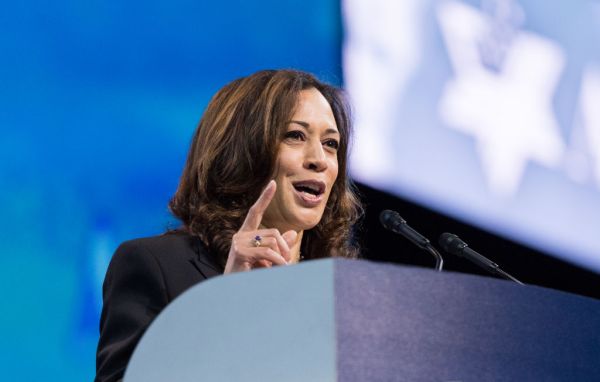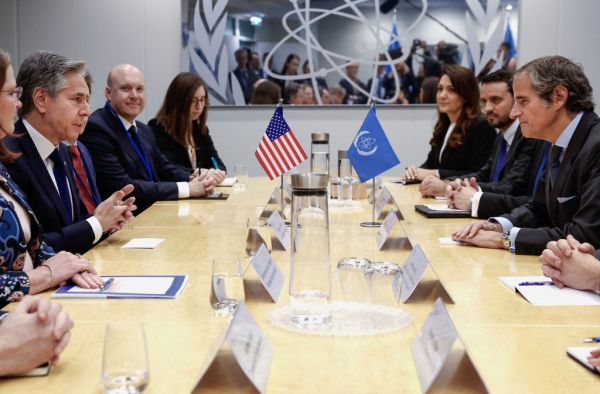Calls for the United States to withdraw from the United Nations have historically been the purview of fringe right-wingers and garden-variety paranoiacs. At a certain moment, however, it is not unreasonable to ask whether there is any point in remaining part of what is swiftly becoming the most corrupt, compromised, and useless international organization since the League of Nations.
Those hostile to the world-government impulses and overall anti-Americanism of the United Nations and its specialized agencies have long questioned its cost and the mission. But in recent years, the international body’s problems have begun to verge on the farcical: Saudi Arabia, Nigeria, Cuba, and Russia elected as members of the U.N. Human Rights Council, with Iran set to chair the council’s Social Forum this week; Iran and North Korea presiding over the U.N. Conference on Disarmament; a Chinese-hand-picked leader managing COVID at the World Health Organization (WHO); rape and sexual abuse rampant among U.N “peacekeeping” forces.
And then there’s the money. The Biden administration requested $1.7 billion in funding for the U.N. (an increase of $265.8 million) for the 2024 fiscal year. But those are just the assessed fees. Biden also asked for $485.8 million for “voluntary contributions” to various United Nations specialized agencies, and $7.4 billion will go to the U.N. through accounts at the State Department and USAID. The total U.S. bill for 2022 (the last year the U.N. did the math) was an eye-popping $18,095,456,587—33.6 percent of total government donations—to the United Nations.
But wait, there’s more! While the COVID debacle—including evidence that WHO Director General Tedros Adhanom Ghebreyesus was complicit in both facilitating China’s delay in sharing genetic sequencing and in the cover-up of Beijing’s role in Covid’s genesis—was cause enough for former President Donald Trump to pull the United States from WHO, it was far from enough to stop the newly minted Biden administration from returning, no questions asked, to that organization. Ditto Trump’s withdrawal from the Human Rights Council, reversed nearly immediately by Team Biden. Indeed, the Biden administration also rejoined UNESCO (the United Nations Educational, Scientific and Cultural Organization, which Trump withdrew the U.S. from in 2017), and requested funding to repay back dues withheld because, in violation of U.S. law, UNESCO admitted a state of “Palestine” in 2011.
But WHO’s complicity in the COVID scandal and the manifest and public malfeasance of the Human Rights Council—particularly its extraordinary and antisemitic obsession with Israel—are merely the tip of the iceberg. A more insidious problem at the United Nations and its specialized agencies is the creeping Communist Chinese domination. Well documented by think tanks and the press, the Beijing government has made the United Nations its pet project. While Washington and Europe slept, Chinese operatives took over Interpol, the International Civil Aviation Organization (ICAO), the International Telecommunications Union (ITU), and myriad other alphabet soups of United Nations and U.N.-related organizations most of us have never heard of.
At ICAO, the former secretary general (now back home in China) covered up a major hacking scandal in 2016 that enabled Beijing’s spies to infiltrate government agencies and private sector companies the world over. At the ITU, which sets global telephony standards, Chinese engineers now dominate the communications standards-setting agenda and hew to instructions from the CCP. Indeed, the implications of a pro-Beijing ITU are hard to understate: a dominant role in setting global standards for emerging technologies like 5G and standard setting for global cell phone and satellite communications. Fundamentally, through the United Nations, China has rendered almost moot national efforts to ban companies like Huawei and ZTE that engage in surveillance and theft on behalf of the Chinese Communist Party.
For the most part, these efforts to suborn the U.N. have been treated in Western capitals as business as usual, the cost of having a truly “international” organization. Even the U.N.’s single-minded efforts to delegitimize the state of Israel and target it with investigations, sanctions and other disproportionate measures have been treated by the U.S. Congress—normally a redoubt of support for the Jewish state—as ho-hum. Until October 7, that is, when in one fell swoop, the United Nations and its specialized agencies turned with unprecedented and near-collective venom against the people of Israel. Finally, it seemed, the U.N. had gone too far.
U.N. Women—a group theoretically devoted to the rights and status of women around the world —remained silent for early two months in response to the appalling rapes, torture, and murder of Israeli women on October 7. (Per the organization, the U.S. government ponied up $20 million for its budget in 2021.) Here’s the deputy honcho of U.N. Women sharing her antisemitism on X, something she did more than 150 times (in violation of the U.N.’s “policy” of neutrality and impartiality) before deleting her accounts:

She’s far from alone. U.N. Secretary General António Guterres also felt the need to explain to the Security Council that the events of October 7 “did not happen in a vacuum.” The U.N. General Assembly demanded a ceasefire. And then there’s the incredible UNRWA can of worms.
For many years, Congress has tried in vain to call attention to the U.N. Relief Works Agency for Palestine, the only United Nations agency devoted to a single national cohort of “refugees” from Israel’s war of independence in 1948. UNRWA is nominally committed to the “human development and relief” of Palestinian refugees, whose numbers have now swelled to 5.9 million. The litany of UNRWA’s organized antisemitic and pro-terrorism labors is long and dispositive. It starts with the very curricula of UNRWA-run schools, where students are taught that Israel is the enemy and that terrorism is justified. UNRWA leadership bashes Israel incessantly in public statements. Thousands of UNRWA teachers celebrated the events of October 7 in a Telegram channel.
Then there’s South Africa’s appalling “genocide” case at the International Court of Justice, a legal complaint so perverted that the United States, Germany, France, and the United Kingdom weighed in against both the process and the arguments themselves. The ICJ is also part of the U.N. system.
Indeed, there are few corners of the United Nations system that have not weighed in against Israel in its war with Hamas. Far from outrage at Hamas’ abuse of women, kidnapping of children, use of human shields, targeting of civilians and worse, most U.N. agencies have singled out only the Jewish state for disapprobation and sanction. And finally, Congress has noticed.
Republican Reps. Michael McCaul, chairman of the House Foreign Affairs Committee, and Mario Diaz-Balart, chairman of the House Appropriations Subcommittee on State and Foreign Operations, have held hearings, stepped up oversight, and generally begun holding the U.S. government’s feet to the fire because of its uncritical support for the U.N. system. While the most vocal criticism has come from the GOP side of Congress, sources tell me that Democrats also agree, quietly, that more questions need to be asked about the United Nations in general, and the organization’s rampant antisemitism in particular.
But here’s the hard question: What exactly does the United Nations do for the United States in return for the tens of billions spent annually? Are U.N. Security Council resolutions useful in maintaining the global order? Does the General Assembly play a constructive role in guaranteeing “world peace?” Are the United Nations specialized agencies promoting the world’s economic interests, or just China’s? Does the International Court of Justice actually deliver justice? If the answer to the questions is consistently “no,” is there not a reasonable conversation to be had about the usefulness of the United Nations overall?
The right answer is to apply a simple test of merit. The International Atomic Energy Agency has delivered little in furtherance of global nuclear non-proliferation, but not nothing. ICAO remains a critical venue for global aviation regulation and standards. But the Human Rights Council, UNESCO, UNRWA, most peacekeeping operations, the Office for the High Commissioner for Human Rights, the Office for the High Commissioner for Refugees, and too many other U.N. “humanitarian” organizations are corrupt, fail to deliver for the neediest, and would generally be better replaced by bilateral or multilateral aid and advocacy programs run by sovereign nations.
The time has come to listen to the criticism of U.N. skeptics and to reassess U.S. taxpayer dollars flowing uncritically, and, for the most part, without accountability to a mass of international organizations that more often than not actively oppose U.S. values and allies. The question is not whether the United States should withdraw from the United Nations entirely. Simply cutting dollars to the least worthy of U.N. bodies will, at the very least, begin the process of ending the waste, fraud, hatred, and abuse that characterizes the work of too much of the United Nations.








Please note that we at The Dispatch hold ourselves, our work, and our commenters to a higher standard than other places on the internet. We welcome comments that foster genuine debate or discussion—including comments critical of us or our work—but responses that include ad hominem attacks on fellow Dispatch members or are intended to stoke fear and anger may be moderated.